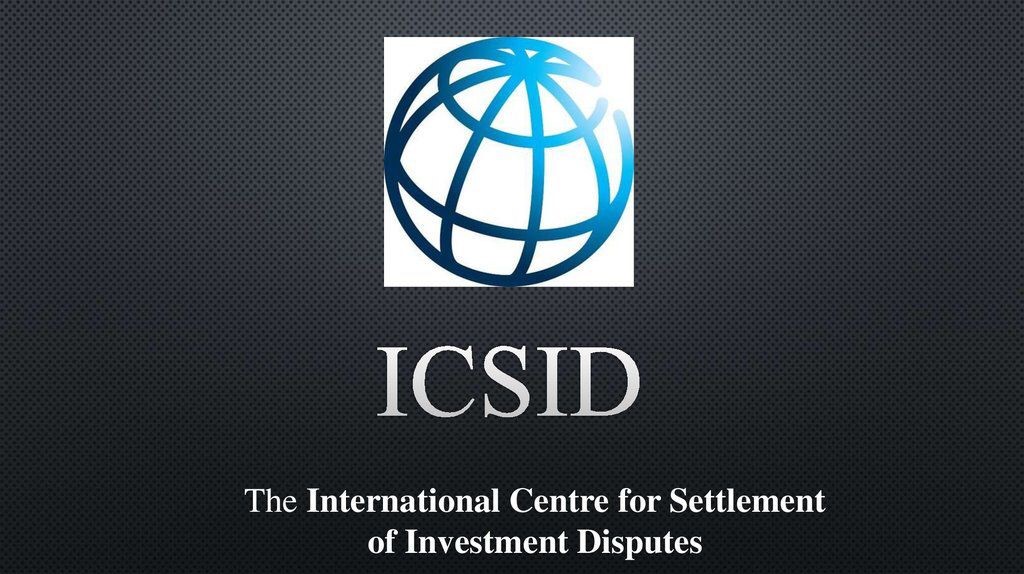The International Centre for Settlement of Investment Disputes (“ICSID”) is an arbitral institution established under the aegis of the World Bank by the Washington Convention of 18 March 1965 for the Settlement of Investment Disputes.
ICSID offers conciliation and arbitration to resolve investment disputes between contracting States and nationals of other contracting States.
This convention is a multilateral treaty aimed at promoting international investment. The competence of ICSID considerably strengthens investor confidence in the dispute settlement process. At the end of year 2020, ICSID convention was ratified by 155 countries.
Several bilateral investment treaties provide for the settlement of disputes through this process, some multilateral treaties and domestic laws may also allow this possibility. Thus, ICSID offers investors the guarantee of an impartial, efficient and independent international arbitration. It is therefore the preferred arbitration for foreign investors.
ICSID is the world’s premier institution for the settlement of investment disputes. It has administered the vast majority of all known international investment cases. Among the highlights of 2020 was a record number of cases (303) closed, as ICSID continues to work with courts and parties to reduce the length and cost of proceedings. The past financial year was also marked by the progress made in the diversification of arbitrators, conciliators and members of ad hoc committees appointed in ICSID cases. A record number of 44 different nationalities were represented among the appointments made in 2020.
Last year ICSID registered 40 new cases, which is the highest number of cases administered in a single year. 37 of these cases were dealt with by the arbitration rules of the ICSID convention. Statistics show that during the year 2020 74% of the proceedings ended with a decision confirming the claims.
Regarding the geographical distribution of new ICSID cases, we can observe the following:
- a large dominance by South American countries representing 32% of cases,
- on second place are the states of Eastern Europe and Central Asia with 20% of cases.
- Western European countries account for 13% cases.
- the Middle East, North Africa and Sub-Saharan Africa represent 10% of cases.
- the percentage of cases from Central America and the Caribbean is 7%.
- finally, a minority of cases come from North America as well as South and East Asia and the Pacific with 5% and 3%.
The business sectors are represented as follows:
– oil, gas and mining industry represents the sector with higher number of cases with a representativeness of 30%.
– electric power and other energies – 20%.
– industry and construction – 17%.
– 23% of cases are in the finance and transport sectors.
– sector of agriculture, fishing and forestry and services and trade with only 3% of cases.
The Convention affirms the full international legal personality of the Center. Thus, the Center has the legal capacity to contract, acquire and dispose of movable and immovable property as well as to take legal action. This independence plays a role in the legal security of investors because it ensures the absence of influence of States on the Center since the existence of the latter is not subject to any subsidy from a State or a person third.
According to the Convention, the purpose of ICSID is to provide conciliation and arbitration to settle investment disputes between Contracting States (or such public authority or such body dependent on it) and the national of another Contracting State who are in direct relation with an investment and which the parties have agreed in writing to submit to the ICSID.
The written consent of the two parties to recourse to this arbitration remains an important provision, a “cornerstone” of the competence which conditions the international competence of ICSID, therefore specific arbitration/conciliation clauses should be incorporated in certain procedures, agreements between States and nationals of other States. In practice, the clauses vary in substance and form depending on the particular case.
The written stipulation is a feature that should not be overlooked, and which generally involves a bilateral or multilateral investment treaty. In many cases the consent of the parties must be contained in a single document, however, the parties may give their consent in separate documents. The wording of this consent is also free.
This condition justifies the considerable proliferation of bilateral investment treaties since the end of the 1980s and consequently the number of proceedings brought before ICSID by investors against States. In this sense, based on the application of bilateral treaties, the procedures are admissible by ICSID, as soon as the states which have signed an investment promotion and protection treaty have acceded to ICSID.
A very important role of ICSID is a conciliation – the Center may, at any stage of the proceeding, recommend from time to time to the parties’ terms of settlement. Indeed, conciliation depends on an agreement between the two parties and therefore avoids a possible dispute which would involve heavy expenses for the investor.
Also, the Convention provides that the Center shall decide a dispute in accordance with the rules of law which the parties may agree upon and in the absence of such an agreement, the law of the Contracting State party to the dispute (including its conflict of law rules) and applicable rules of international law will be applied”.
This illustrates the advantage of the investor in the context of an arbitration procedure preceded by an agreement between the two parties since the rules already provided and agreed by the investor will be applied. In the absence of agreement, the arbitrator has flexibility between the rules of the Contracting State party to the dispute and the rules of international law. This flexibility, and in particular openness to the rules of international law, provides investors with a certain degree of security in obtaining a fair trial.
There are three rules to provide legal certainty for both parties to the trial: interpretation, revision and cancellation. Indeed, if a dispute follows the award, a request for interpretation may be requested by the investor. Also, if a fact likely to exert an influence on the award was discovered after the pronouncement of the award and which was disregarded before the pronouncement of the latter, the investor can request and obtain a review of the sanction.
Finally, if formal rules have been violated, the investor may request that the award be cancelled. These three rules therefore present for the investor, as for the host State, legal certainty which the investor could avail himself of if the application of the ICSID convention is applicable.
At the end, some words about enforcement: The award rendered by an ICSID tribunal is binding on the parties and may not be the subject to any appeal or other remedy, except those provided for in the Convention. Further each Contracting State recognizes an award rendered within the framework of this Convention as binding and ensures the performance in its territory of the pecuniary obligations which the award imposes as if it were a final judgment of a court in that State.
Since its inception, the Washington Convention, as a universal multilateral treaty, has laid the foundation for the legal consolidation of a universal international legal mechanism for the protection of foreign investments.
International investment is a complex challenge. It needs to have a clear visibility on the project as well as a full legal support. In this regard one of the most important points of checklist before making international investment is, firstly, to verify whether the Investor’s state is party of a Convention as well as a Host State and, secondly, to insert the ICSID clause in investment agreements.
SRDB law firm follows these important international issues and assist the companies on all steps of foreign investments process, including but not limited to, arbitration before International Center for Settlement of Investment Disputes.
Iuliia KRUK-BOURDIN Georges SIOUFI
Avocat à la Cour Avocat à la Cour
This article was written under the sole responsibility of its authors.

